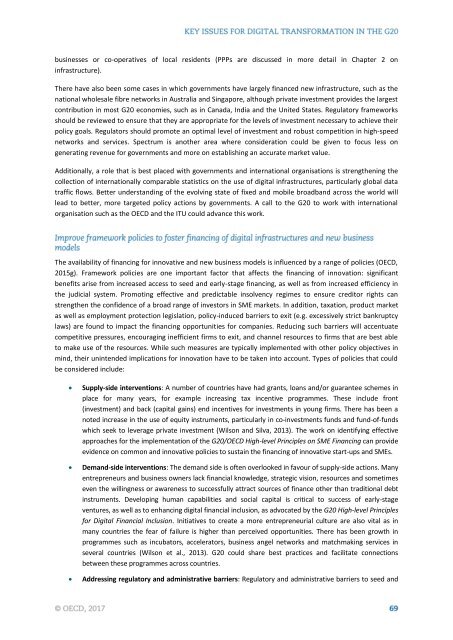KEY ISSUES FOR DIGITAL TRANSFORMATION IN THE G20
2jz0oUm
2jz0oUm
Create successful ePaper yourself
Turn your PDF publications into a flip-book with our unique Google optimized e-Paper software.
usinesses or co-operatives of local residents (PPPs are discussed in more detail in Chapter 2 on<br />
infrastructure).<br />
There have also been some cases in which governments have largely financed new infrastructure, such as the<br />
national wholesale fibre networks in Australia and Singapore, although private investment provides the largest<br />
contribution in most <strong>G20</strong> economies, such as in Canada, India and the United States. Regulatory frameworks<br />
should be reviewed to ensure that they are appropriate for the levels of investment necessary to achieve their<br />
policy goals. Regulators should promote an optimal level of investment and robust competition in high-speed<br />
networks and services. Spectrum is another area where consideration could be given to focus less on<br />
generating revenue for governments and more on establishing an accurate market value.<br />
Additionally, a role that is best placed with governments and international organisations is strengthening the<br />
collection of internationally comparable statistics on the use of digital infrastructures, particularly global data<br />
traffic flows. Better understanding of the evolving state of fixed and mobile broadband across the world will<br />
lead to better, more targeted policy actions by governments. A call to the <strong>G20</strong> to work with international<br />
organisation such as the OECD and the ITU could advance this work.<br />
The availability of financing for innovative and new business models is influenced by a range of policies (OECD,<br />
2015g). Framework policies are one important factor that affects the financing of innovation: significant<br />
benefits arise from increased access to seed and early-stage financing, as well as from increased efficiency in<br />
the judicial system. Promoting effective and predictable insolvency regimes to ensure creditor rights can<br />
strengthen the confidence of a broad range of investors in SME markets. In addition, taxation, product market<br />
as well as employment protection legislation, policy-induced barriers to exit (e.g. excessively strict bankruptcy<br />
laws) are found to impact the financing opportunities for companies. Reducing such barriers will accentuate<br />
competitive pressures, encouraging inefficient firms to exit, and channel resources to firms that are best able<br />
to make use of the resources. While such measures are typically implemented with other policy objectives in<br />
mind, their unintended implications for innovation have to be taken into account. Types of policies that could<br />
be considered include:<br />
<br />
<br />
<br />
Supply-side interventions: A number of countries have had grants, loans and/or guarantee schemes in<br />
place for many years, for example increasing tax incentive programmes. These include front<br />
(investment) and back (capital gains) end incentives for investments in young firms. There has been a<br />
noted increase in the use of equity instruments, particularly in co-investments funds and fund-of-funds<br />
which seek to leverage private investment (Wilson and Silva, 2013). The work on identifying effective<br />
approaches for the implementation of the <strong>G20</strong>/OECD High-level Principles on SME Financing can provide<br />
evidence on common and innovative policies to sustain the financing of innovative start-ups and SMEs.<br />
Demand-side interventions: The demand side is often overlooked in favour of supply-side actions. Many<br />
entrepreneurs and business owners lack financial knowledge, strategic vision, resources and sometimes<br />
even the willingness or awareness to successfully attract sources of finance other than traditional debt<br />
instruments. Developing human capabilities and social capital is critical to success of early-stage<br />
ventures, as well as to enhancing digital financial inclusion, as advocated by the <strong>G20</strong> High-level Principles<br />
for Digital Financial Inclusion. Initiatives to create a more entrepreneurial culture are also vital as in<br />
many countries the fear of failure is higher than perceived opportunities. There has been growth in<br />
programmes such as incubators, accelerators, business angel networks and matchmaking services in<br />
several countries (Wilson et al., 2013). <strong>G20</strong> could share best practices and facilitate connections<br />
between these programmes across countries.<br />
Addressing regulatory and administrative barriers: Regulatory and administrative barriers to seed and


